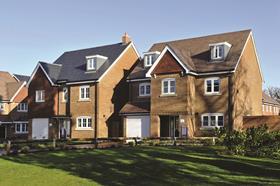Government subsidy now used in 35% of housebuilder’s completions, up from 30% in 2016

Boosted by the government’s Help to Buy programme, Bellway saw turnover for the year to the end of July up by more than 14% while pre-tax profit also turned in double digit growth.
The firm – the UK’s fifth largest housebuilder – recorded turnover of £2.56bn and pre-tax profit up 13% to £561m. Its operating margin rose 30bps to 22.3%.
Bellway said it completed 9,644 houses, up 11%. Help to Buy continued to be “an important selling tool” it added, used in 35% of completions, up from 30% in 2016. In London, Help to Buy was used in 32% of completions.
The average selling price for its homes rose 3% to £260,354, while the average price for its private homes was up 6.3% to £296,018. Bellway said the increase was down to previous investment in higher value locations, plus what it called “modest house price inflation”.
The group’s owned and controlled land bank, including those plots with detailed planning permission and those within its plot pipeline, comprised 37,855 plots, up 8%.
Bellway said the satisfaction of pre-commencement conditions presented challenges to the industry but added the planning backdrop was “positive” and it was seeing the number of planning permissions granted across the UK on the rise.
Earlier this month, housebuilder Cala Group slammed what it called “the small-scale working of local politics”, which in a number of instances was holding up planning permission.
But Bellway said the positive effect of the National Planning Policy Framework in relation to encouraging local authorities to prepare a local plan and provide land for housing supply remained.
And while the detail had to be thrashed out, the firm said proposals in the government’s Housing White Paper “should improve the efficiency of the planning process and increase the delivery of new homes”.
The firm said if market conditions remained stable it expected to grow volume by at least 5% in the coming year and complete the sale of around an additional 500 homes and raise the average selling price to £280,000, due to work on higher value developments including a scheme at Battersea power station.



























No comments yet